
Latest News Regarding
Horn of Africa
Sudan’s Displaced Number Almost 10 Million
Sudan’s Displaced Number Almost 10 Million
Source: Aljazeera published on 7 June 2024 an article titled “Dozens Killed Near Sudan’s Capital as UN Warns of Soaring Displacement.”
An official with the International Organization of Migration said 9.9 million people are now displaced across Sudan. An official with the World Food Program added that Sudan is “on the verge of collapse.
Security measures in Oslo for Somali President Hassan Sheikh Mohamud’s visit
Security measures in Oslo for Somali President Hassan Sheikh Mohamud’s visit

Source: Hiiraan Online,, Monday June 10, 2024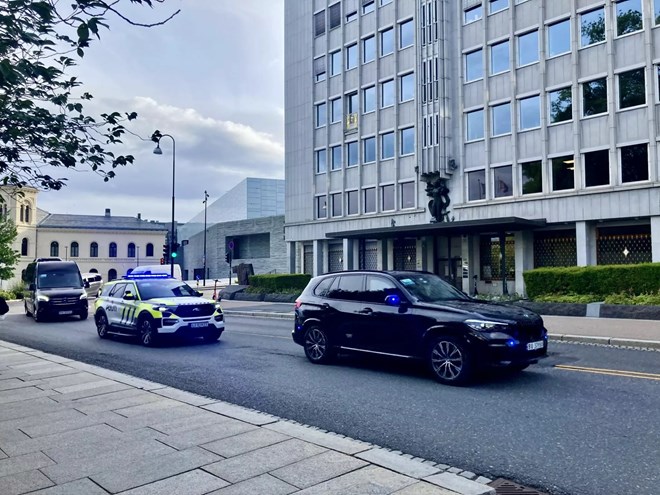
The police motorcycle leads the procession. Photo: Ingri Valen Egeland
OSLO, Norway (HOL) – Somali President Hassan Sheikh Mohamud began a three-day working visit to Norway on Sunday.
Upon his arrival in Oslo, President Mohamud was welcomed with significant security measures. A long procession of police vehicles and black cars moved through the city center, temporarily halting traffic. “It’s a significant visit,” said Operations Manager Rune Hekkelstrand of the Oslo Police District.
President Mohamud’s itinerary includes bilateral talks with the Norwegian Prime Minister, focusing on economic cooperation, security, and development initiatives. According to a statement from Villa Somalia, these discussions aim to “further enhance the Somalia-Norway strategic bilateral relations in various areas of mutual interest.”
In addition to his meetings, The Somali National News Agency reported that President Mohamud will deliver a keynote address at the Oslo Forum 2024, an annual retreat known for bringing together global leaders and policymakers to discuss peace and conflict resolution.
However, opposition groups have criticized the President’s travel to Europe amid deadly inter-clan fighting in central Somalia. The fighting has resulted in 50 deaths and over 60 injuries in a village between the Herale and Abudwak districts in the Galgadud region. On the same day, al-Shabab attacked El-dher village in the Galgadud region, where the Somali government reported that five government soldiers and 47 al-Shabab militants were killed.
Somalia joins UN Security Council after more than 50 years
Somalia joins UN Security Council after more than 50 years

Source: VOA, Friday June 7, 2024
By Mohamed Olad Hassan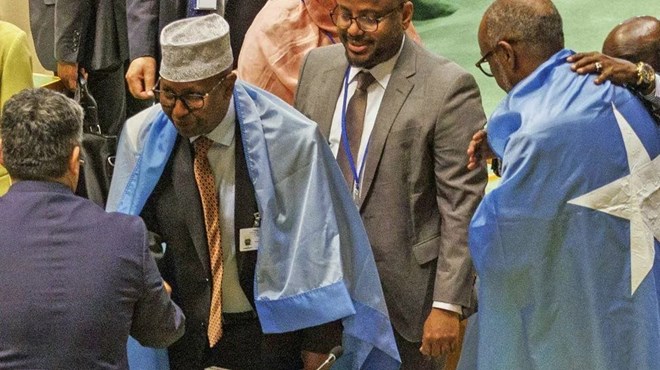
Somali officials celebrated in the General Assembly after the vote [EPA]
WASHINGTON — The United Nations General Assembly on Thursday elected Somalia to the 15-member U.N. Security Council for a two-year term starting in 2025.
The tiny Horn of Africa nation was among five countries that received the winning votes, alongside Denmark, Greece, Pakistan, and Panama.
“It is both symbolic and strong diplomatic status for Somalia to appear among the Security Council members and this will help Somalia to have a better access for member nations,” said Somalia analyst Abdiqafar Abdi Wardhere, who is based in Virginia.
For the first time in more than 50 years, he said, Somalia will have a vote on decisions regarding world conflicts.
“The Security Council is the only U.N. body that can make legally binding decisions such as imposing sanctions and authorizing use of force. Therefore, Somalia would get a vote that determines the world issues and resolutions,” Wardhere said.
Announcing the elections’ results, the U.N. General Assembly President Dennis Francis, said, “In a secret ballot, the elected countries secured the required two-thirds majority of Member States present and voting in the 193-member General Assembly.”
Following the news, the United Nations in Somalia congratulated the Somali government and its people “on their country’s election today to a seat on the UN Security Council for 2025-2026.”
“Somalia has come a long way over the past three decades on its path to peace, prosperity, and security,” said the UN Secretary-General’s Acting Special Representative for Somalia James Swan. “Election to a seat on the Security Council is recognition of that commendable progress.”
“Somalia’s experiences place it in a unique position to contribute to Council deliberations on international peace and security,” Swan added.
The Security Council’s five permanent veto-wielding members are Britain, China, France, Russia and the United States.
The five countries that got elected Thursday will replace Ecuador, Japan, Malta, Mozambique and Switzerland, whose terms end December 31.
Somali and the other elected new members will join existing non-permanent members Algeria, Guyana, the Republic of Korea, Sierra Leone and Slovenia, whose terms started in January.
According to United Nations, the 10 non-permanent seats on the Security Council are distributed according to four regional groupings: Africa and Asia; Eastern Europe; Latin America and the Caribbean; and the Western European and other States group.
The newly elected members were endorsed by their respective regional groups and ran largely uncontested.
Margaret Besheer contributed this report from New York.
President William Ruto interview: What’s Kenya’s role on the global stage?
President William Ruto interview: What’s Kenya’s role on the global stage?

Source: Aljazeera, Thursday June 6, 2024https://www.youtube.com/embed/OyC_GKeD9yo
Redi Tlhabi discusses Kenya’s role as a US ally and security partner with President William Ruto.United States President Joe Biden hosted Kenyan President William Ruto on the first official visit by an African head of state since 2008. The two leaders discussed a deepening partnership around US investments in Kenya’s trade, technology, green initiatives and debt relief.
Biden has designated Kenya as a major non-NATO ally, while rivals like China and Russia have grown in influence on the continent.
The trip bolstered Kenya’s reputation as a peacemaker in neighbouring conflicts, like Sudan’s civil war, and on the global stage. In Haiti, Kenya is leading a multinational peacekeeping mission funded by the US, with 1,000 Kenyan police officers deploying imminently to fight gangs in Port-Au-Prince.
Kenya’s closeness to the US amid public outrage over US support for Israel has also raised questions. The East African nation supports a ceasefire and two-state solution, but has fallen short of condemning US policy towards Israel amid its eight-month-long military assault on Gaza.
So how is Kenya handling a close US alliance amid regional and international conflict? And will Ruto’s policies withstand mounting criticism?
On this special episode of South to North, Redi Tlhabi sits down with Kenyan President William Ruto to discuss Kenya’s diplomatic and military peacekeeping efforts as well as its global standing.
‘Serious breaches’ of international law committed in Tigray War, watchdog says
‘Serious breaches’ of international law committed in Tigray War, watchdog says

Source: ABC news, By Emma Ogao
Thursday June 6, 2024
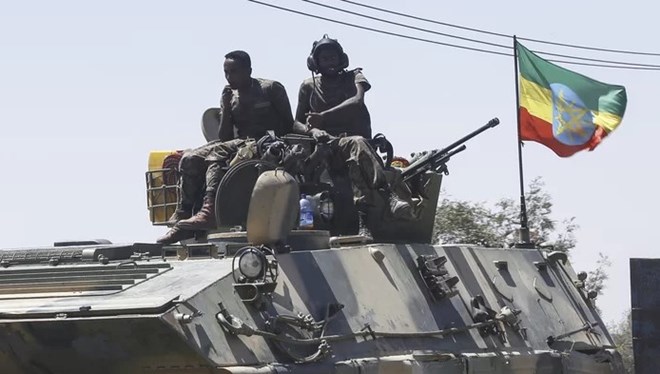
Ethiopian army units patrol the streets of Mekele in northern Ethiopia’s Tigray region in March after the city was captured during an operation against the Tigray People’s Liberation Front (TPLF).
Minasse Wondimu Hailu/Anadolu Agency via Getty Images
LONDON — There were “serious breaches” of international law and crimes against humanity were committed during the two-year Tigray War, according to a report released by U.S think tank New Lines Institute.
The report said it found “reasonable basis” that all parties in the conflict committed war crimes and “serious” breaches of international law. Ethiopia’s Defence Force and allied forces also appeared to have committed “crimes against humanity” and “acts of genocide” against Tigrayans as an ethnic group, the report said.
“These acts of genocide include killings, the infliction of serious bodily and mental harm, intentional measures to prevent births, and the deliberate infliction of conditions of life calculated to bring about the destruction of Tigrayans,” said Dr. Azeem Ibrahim, senior director of the New Lines Institute.
The report published Monday is intended to relate “multiple and widespread” reports of atrocities committed during the conflict to the U.N.’s Genocide Convention.
“These findings, drawn from a critical mass of evidence, underscore our collective legal responsibility as signatory states to the Geneva Conventions and the Genocide Convention to prevent further atrocities in the region,” said former U.S. Ambassador at Large for War Crimes Issues David Scheffer, who wrote the report’s afterward.
Among the evidence laid out in the report is a speech by Ethiopian Prime Minister Abiy Ahmed’s social affairs advisor, Daniel Kibret, which was found to openly advocate genocide against Tigrayans.
“We can only erase it,” Kibret said in reference to Tigray, in a speech widely criticized as dangerous, including by the U.S. government.
The report also cites testimony from a senior envoy to the European Union, Pekka Haavisto, who revealed to the media that he was told Ethiopia was planning to “wipe out the Tigrayans for 100 years” in a closed-door meeting attended by Ahmed, the prime minister.
“Victims will carry with them scarring and abuse from a conflict that, despite an apparent cessation of hostilities in 2022, did not result in a stable peace,” Ibrahim said.
The report also said it found “reasonable basis” that starvation was used as a weapon of warfare by Ethiopia’s government, a claim Addis Ababa has denied.
The two-year Tigray War, which ended in November 2022, has been described as one of the deadliest conflicts of the 21st century; the conflict erupting just a year after Ahmed won a Nobel Peace Prize for his efforts to resolve the border conflict with neighboring Eritrea.
Fighting broke out in November 2020 after Ahmed ordered a military offensive in the northern Tigray region after months of tensions, accusing the Tigray People’s Liberation Front (TPLF) of attacking a federal army base just outside Tigray.
The conflict — fought between forces allied to the Ethiopian Federal Government against TPLF and allied militias — soon spilt to neighboring regions. Researchers from Ghent University told ABC News the conflict was estimated to have killed up to 378,000 people.
“Tigray was a terrible, terrible time, and we haven’t talked about it recently, and yet there is speculation about famine there again,” said U.N. Relief Chief Martin Griffiths at a press conference on Tuesday. At least 21.4 million people are estimated to need humanitarian assistance this year.
ABC News has reached out to Ethiopia’s Federal Government for comment
Denmark, Greece, Pakistan, Panama and Somalia are set to get seats on the UN Security Council
Denmark, Greece, Pakistan, Panama and Somalia are set to get seats on the UN Security Council

Source: AP, By EDITH M. LEDERER
Thursday June 6, 2024
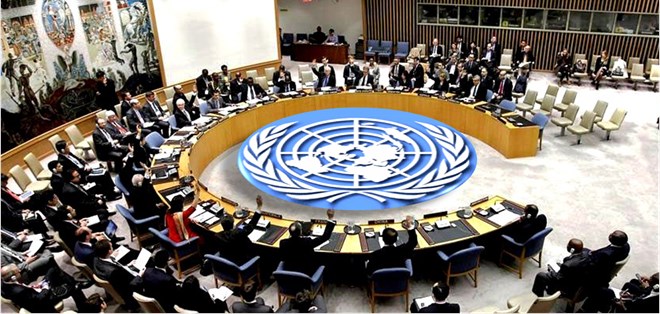
UNITED NATIONS — Denmark, Greece, Pakistan, Panama and Somalia were set to get seats on the U.N. Security Council in a secret ballot Thursday in the General Assembly.
The 193-member world body is scheduled to vote to elect five countries to serve two-year terms on the council. The 10 non-permanent seats on the 15-member council are allotted to regional groups who usually select their candidates but sometimes can’t agree on one. There are no such surprises this year.
Last year, Slovenia soundly defeated Russia’s close ally Belarus for the seat representing the East European regional group, a vote that reflected strong global opposition to Russia’s full-scale invasion of Ukraine.
This time, the regional groups put forward Somalia for an African seat, Pakistan for an Asia-Pacific seat, Panama for a Latin America and Caribbean seat, and Denmark and Greece for two mainly Western seats.
The five council members elected Thursday will start their terms on Jan. 1, replacing those whose two-year terms end on Dec. 31 — Mozambique, Japan, Ecuador, Malta and Switzerland.
They will join the five veto-wielding permanent members — the United States, Russia, China, United Kingdom and France — and the five countries elected last year — Algeria, Guyana, South Korea, Sierra Leone and Slovenia.
The Security Council is charged with maintaining international peace and security. But because of Russia’s veto power it has been unable to take action on Ukraine — and because of close U.S. ties to Israel it has not called for a cessation of hostilities in Gaza.
All five countries expected to win seats on Thursday have served previously on the Security Council – Pakistan seven times, Panama five times, Denmark four times, Greece twice and Somalia once.
Virtually every country agrees that almost eight decades after the United Nations was established the Security Council needs to expand and reflect the world in the 21st century, not the post-World War II era reflected now.
But with 193 countries with national interests, the central question — and the biggest disagreement — is exactly how. And for four decades, those disagreements have blocked any significant reform of the U.N.’s most powerful body.
Why is Kenya investigating alleged abuse by UK soldiers?
Source: EXPLAINER
Why is Kenya investigating alleged abuse by UK soldiers?
Multiple offences, including a murder, have hounded British soldiers in Kenya for years.

By Shola Lawal
Source: Explainer, Published On 1 Jun 20241 Jun 2024
Kenya this week kick-started public hearings into widespread allegations that United Kingdom soldiers stationed in the East African country have committed multiple human rights violations.
For over a decade, locals on different occasions accused British soldiers training in towns in central Kenya of misconduct, environmental degradation, murder, and a host of other serious offences.
KEEP READING
list of 3 itemslist 1 of 3
‘Major non-NATO ally’: What does Biden’s new Kenya pledge mean?
list 2 of 3
Kenya braces for 3 days of anti-gov’t protests: All the details
list 3 of 3
‘I blame the government’: Poor Kenyans say no support amid record flooding
end of list
The hearings mark the culmination of long-winded legal proceedings to try British soldiers under Kenyan law following years of lobbying by civil society groups and after initial pushback from the British government.
Here’s what we know about the abuse allegations and what’s expected to happen after the hearings:
What is BATUK and what are members accused of?
The British Army Training Unit Kenya (BATUK) is a permanent training support force based in Nanyuki, central Kenya – and it has existed since Kenyan independence from the UK in 1963.
BATUK has about 100 permanent staff and some 280 rotating short-term regiments from the UK. The unit trains British troops and provides antiterrorism training for Kenyan troops facing the al-Shabab armed group.
Although the unit has become essential for the economy in Nanyuki and surrounding counties close to training sites, with hundreds of locals employed and with many shops catering to the soldiers, residents have long listed grievances against the troops. Unexploded bombs left from training have claimed people’s limbs in multiple incidents.
Lethal chemicals, such as white phosphorus used in the training exercises, have also raised concerns. The chemical is believed to have contributed to a massive blaze that ripped through the privately owned Lolldaiga Conservancy in March 2021, burning swaths of forest. Locals said the smoke pressed in on them for days and caused eye and inhalation problems. Others said it pushed wildlife onto their farms, leading to crop loss. Some 5,000 people have sued BATUK over that incident.
Advertisement
Who is Agnes Wanjiru?
Sexual abuse claims are also key among the allegations, with several accusations of assault by troops against local women. One soldier in 2021 was dismissed and fined for lifting the skirts of a local woman in public.
In the highest profile case to date, UK soldiers are accused of the March 2012 murder of 21-year-old Agnes Wanjiru in a hotel in Nanyuki. The woman’s body was found in a septic tank two months later close to the room the soldiers used.
Somalia to expel Ethiopian troops unless Somaliland port deal scrapped, official says
Somalia to expel Ethiopian troops unless Somaliland port deal scrapped, official says

Source: Reuters, Monday June 3, 2024
By Giulia Paravicini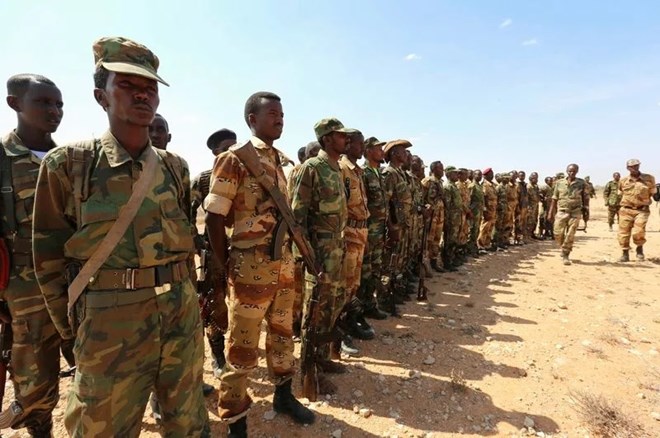
FILE PHOTO: Ethiopian and Somali government soldiers line-up before embarking on a joint patrol in areas south east of Dusamareeb
NAIROBI (Reuters) – Somalia will expel thousands of Ethiopian troops stationed in the country to help with security by the end of the year unless Addis Ababa scraps a disputed port deal with the breakaway region of Somaliland, a senior Somali official said on Monday.
Security experts and foreign diplomats said the move risks further destabilising Somalia as local forces would be unable to fill the security vacuum, which would likely be exploited by fighters from al Shabaab, an affiliate of al Qaeda.
At least 3,000 Ethiopian soldiers are stationed in the Horn of Africa country as part of an African Union peacekeeping mission (ATMIS) fighting al Shabaab, which controls large portions of Somalia, while an estimated 5,000-7,000 are stationed in several regions under a bilateral agreement.
Relations between Mogadishu and Addis Ababa nosedived earlier this year after landlocked Ethiopia agreed to lease 20 km (12 miles) of coastline from Somaliland – a part of Somalia which claims independence and has had effective autonomy since 1991, but has failed to win international recognition.
Ethiopia offered Somaliland possible recognition in exchange for being allowed to set up a naval base and commercial port – a move Mogadishu has called illegal.
“If they do not repeal the (agreement) before the end of June, or when the new mandate of the mission is decided, all Ethiopian troops, ATMIS and bilateral, will have to go,” Somalia’s national security adviser Hussein Sheikh-Ali told Reuters by phone.
“Ethiopia cannot be an ally and at the same time an aggressor.”
Spokespeople for the Ethiopian government and the Ethiopian National Defence Forces (ENDF) did not respond to requests for comment.
The African Union Transition Mission in Somalia (ATMIS), which is mandated by the U.N. Security Council, is due to fully withdraw and hand over security responsibilities to the Somali state by the end of 2024.
But the Somali government has requested several times for the withdrawal of troops to be slowed down, citing setbacks on the battlefield. The troops come from Burundi, Djibouti, Uganda, Kenya and Ethiopia.
A new, smaller peacekeeping mission is expected to be announced by the end of June, with Somalia requesting that Ethiopia not be among the troop contributing countries, according to AU and African diplomats familiar with the plan.
“Given the current political climate, it will not possible to have ENDF be part of AU-led mission,” Somalia’s state minister for foreign affairs Ali Omar told Reuters.
(Reporting by Giulia Paravicini; Editing by Hereward Holland, William Maclean)
Renewed clashes between Somali and Afar armed forces erupt in Ethiopia’s Sitti region
Renewed clashes between Somali and Afar armed forces erupt in Ethiopia’s Sitti region

Source: Hiiraan Online, Monday June 3, 2024
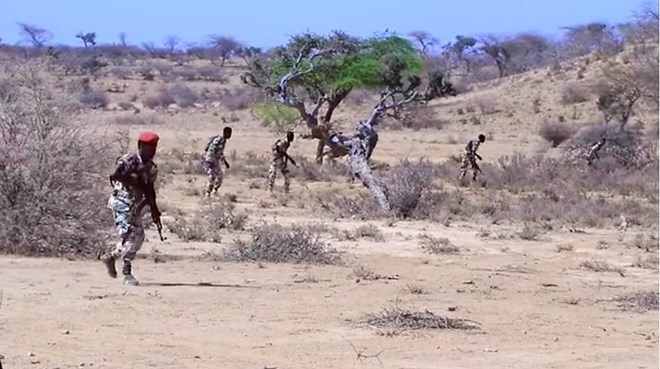
Jigjiga (HOL) – Heavy fighting erupted between rival armed forces from the Somali and Afar ethnic groups in villages located in the western Sitti region of the Somali regional state in Ethiopia.
The clashes began in Dhunyar and other villages and have been ongoing for the last two days. Several casualties have been reported but cannot be independently verified.
There have been no official statements from the Somali and Afar administrations about the renewed fighting in the western Sitti region, and the motive behind the resurgence of the conflict remains unclear.
The conflict between the Somali and Afar people living in Ethiopia has not yet been resolved. The latest fighting between the two ethnic groups erupted in Asbuli town, located in the Sitti region, last March
Flooding kills 528 in East Africa amid heavy rains
Flooding kills 528 in East Africa amid heavy rains

Source: Xinhuanet, Saturday June 1, 2024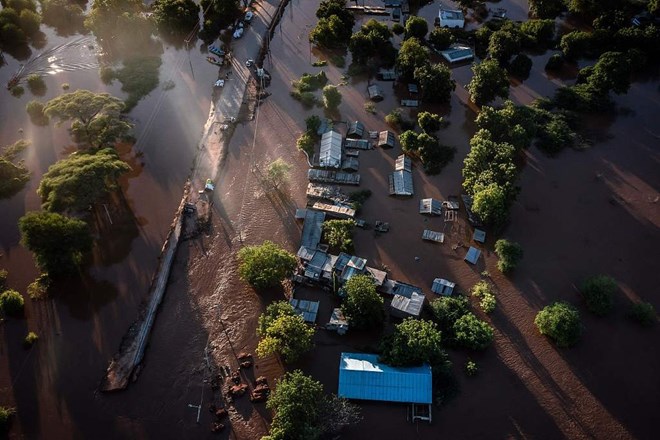
This aerial view shows the damages of a main road and houses submerged in water following heavy floods in Garissa, on May 8, 2024. (Photo: CFP)
At least 528 people had been killed by heavy rains and flash floods that continue to cause damage and displacement across East Africa, the United Nations relief agency said on Friday.
advertisements
The UN Office for the Coordination of Humanitarian Affairs (OCHA) said that as of May 30, about 1.6 million people, mainly in Ethiopia, Kenya and Somalia, had been affected, including up to 482,320 people displaced.
“Humanitarian partners across the East African region continue to support governments in search and rescue operations, conducting needs assessments, pre-positioning available stocks, and providing urgent assistance,” the OCHA said in its heavy rains update released in the Kenyan capital of Nairobi.
Rainfall was expected to decrease in the arid and semi-arid areas of Kenya, Somalia, and southern-southeast Ethiopia in late May.
However, according to the Climate Prediction and Applications Center of the Intergovernmental Authority on Development, several areas in the region — Djibouti, Eritrea, central and northern Ethiopia, western and coastal Kenya, much of Uganda, South Sudan and Sudan — are expected to receive above-average rainfall for the June-to-September period.
June to September is an important rainy season, especially in the northern and western parts of the Greater Horn of Africa, where it generally contributes more than 40 percent of the annual rainfall and more than 90 percent in parts of the north.
Climate Change and Conflict in South-central Somalia
Climate Change and Conflict in South-central Somalia
Source: The Stockholm International Peace Research Institute published in May 2024 a report titled “Burning Ground: Tackling Climate Change and Conflict in South-central Somalia” by Kheira Tarif.
The report explains how climate action can be used as a platform for reducing violent conflict over natural resources, fostering cross-clan collaboration on climate-smart infrastructure and nature-based solutions; and forging or strengthening relationships between formal authorities and rural communities.
Repair of South Sudan’s Oil Pipeline to Port Sudan
Repair of South Sudan’s Oil Pipeline to Port Sudan
Source: The Arab Weekly published on 29 May 2024 an article titled “Repaired Sudan Oil Pipeline, a Key Source of Revenue for Juba, to Resume Operation.”
Oil provides 90 percent of South Sudan’s foreign exchange earnings. One of its two pipelines, which carries two-thirds of its total oil exports, has been out of service since February due to the civil war in Sudan. The rupture of the Chinese-Malaysian pipeline has been repaired and oil can flow again once the waxy crude has been flushed through the line.
Türkiye’s military and technical support key to Somalia’s stability, says ambassador
Türkiye’s military and technical support key to Somalia’s stability, says ambassador

Source: Hiiraan Online, Thursday May 30, 2024

Fathudin Ali Mohamed, Somalia’s ambassador to Türkiye, stands between portraits of Somali President Hassan Sheikh Mohamud and Turkish President Recep Tayyip Erdogan (Photo: AA Archive)
ANKARA, Türkiye (HOL)—Türkiye’s military and civil technical support is vital for Somalia’s stability and economic well-being, according to Fathudin Ali Mohamed, Somalia’s recently appointed ambassador to Türkiye. In an interview with Turkish national public broadcaster TRT, Mohamed emphasized that Türkiye’s assistance benefits Somalia and contributes to the security and prosperity of the entire region.
“Türkiye’s military and civil technical support will not only contribute to Somalia’s stability and economic well-being but also support the security and prosperity of the region as a whole,” Mohamed stated, underscoring the transformative impact of Turkish support.
A cornerstone of Türkiye-Somalia relations is military cooperation. Camp TURKSOM, a Turkish military training base in Somalia, has trained thousands of Somali youths, transforming them into well-equipped soldiers who now stand at the forefront of the fight against terrorism. “These trained and equipped soldiers are now on the front lines in the fight against terrorism,” Mohamed remarked, underlining the tangible outcomes of this cooperation. Türkiye has trained over 16,000 Somali soldiers, equivalent to one-third of the Somali military, both in Türkiye and at its Mogadishu base. Turkish-supplied drones are also operational against the al-Shabab armed group in Somalia.
Beyond military support, Türkiye has made substantial investments in Somali education and infrastructure. Since 2011, thousands of Somali students have studied in Türkiye, gaining skills and knowledge that they bring back to help rebuild their homeland. “The education pillar of our partnership is crucial. Somali students returning from Türkiye are vital to our nation’s reconstruction,” Mohamed emphasized. Turkish companies have also played a key role in reconstructing Mogadishu’s airport and port, significantly boosting the city’s infrastructure and economic prospects. The Turkish-built terminal of Aden Abdulle International Airport in Mogadishu has improved the airport’s capacity and services.
Historical ties between Türkiye and Somalia date back to the Ottoman Empire, laying a solid foundation for current relations. A pivotal moment was Türkiye’s assistance during Somalia’s devastating drought in 2011 when then Prime Minister Recep Tayyip Erdogan visited and established long-term strategies over immediate emergency responses. Türkiye’s humanitarian efforts also extend to Gaza, which has proactively addressed crises. “We appreciate Türkiye’s efforts to end this brutality and strive to provide all the support we can,” Mohamed noted. Despite limited resources, Somali people have organized campaigns to show solidarity with Palestinians.
Looking ahead, Mohamed expressed optimism about expanding agricultural cooperation.”Our rich agricultural lands have the potential to become more productive with the support of Turkish farmers and the transfer of technology, which would enhance food security and lead to the country’s sustainable development,” he added.
In addition to existing cooperation, Türkiye plans to construct and donate an embassy building and a plot of land to Somalia at an estimated cost of over $6 million. Although the project has faced criticism in Turkish media due to its timing amid domestic austerity measures, it underscores the deepening diplomatic ties between the nations. Furthermore, a ten-year security agreement signed in February 2024 entrusts Türkiye with supporting Somalia’s maritime security by modernizing and training its naval forces. The pact includes joint exploration of hydrocarbons in Somalia’s exclusive economic zone, with Türkiye receiving a 30 percent revenue share from untapped marine resources in exchange for enhancing Somalia’s maritime security.
Over 74 mln people are food insecure in Horn of Africa: report

Source: Xinuanet, Friday May 31, 2024
NAIROBI (Xinhua) — Some 74.9 million people in the Greater Horn of Africa region are highly food insecure and in urgent need of humanitarian assistance, according to a report released on Wednesday by the Food and Agriculture Organization of the United Nations (FAO) and the Intergovernmental Authority on Development (IGAD), an East African bloc.
The two institutions said out of the number, 46.8 million people were from seven of the eight IGAD member states. These are Djibouti, Kenya, Somalia, South Sudan, Tanzania, Sudan and Uganda. The rest are Burundi, the Central African Republic (CAR) and the Democratic Republic of the Congo (DRC).
The report attributes the rise in the number of food-insecure people in the region from 58.1 million people in February to flooding caused by heavy rains.
“Heavy rains from late March through April have led to severe flooding, especially in Kenya, Somalia, Burundi and Tanzania, causing loss of lives and livestock, displacing hundreds of thousands of people, and destroying farmlands and critical infrastructure such as roads, bridges and dams,” they said in an April report.
“Despite increased agricultural performance in some parts of the region as a result of the enhanced rains, increased levels of acute food insecurity are probable in the severely affected areas,” the institutions said.
They observed that the nutrition situation across the region remained concerning, largely driven by conflict, displacement, food insecurity, infectious diseases and poor water, hygiene and sanitation conditions.
The bulk of those who are food insecure (20.4 million) are in DRC, followed by Sudan at 12.8 million and South Sudan at 4.6 million, according to FAO and IGAD. “The nutrition situation in Sudan is rapidly deteriorating, marked by an alarming increase in acute malnutrition cases, even as parts of the country face a progressively increasing risk of famine,” the report said.
It added that apart from the food crisis, the Greater Horn of Africa region is also grappling with multiple disease outbreaks, including cholera, malaria, measles, dengue, yellow fever, and polio, as wetter-than-normal conditions observed over most parts of the region heightened the risk of water-borne and vector-borne diseases due to flooding.
The Horn of Africa is expected to experience more rains between June-September, according to the latest forecast by IGAD’s Climate Prediction Center.
According to the United Nations Office for the Coordination of Humanitarian Affairs (OCHA), some 473 people lost their lives in Ethiopia, Kenya, Somalia, Uganda, Burundi, and Tanzania due to flooding between March and April, with the rains affecting over 1.6 million people in the region.
Over 74 mln people are food insecure in Horn of Africa: report

Friday May 31, 2024
NAIROBI (Xinhua) — Some 74.9 million people in the Greater Horn of Africa region are highly food insecure and in urgent need of humanitarian assistance, according to a report released on Wednesday by the Food and Agriculture Organization of the United Nations (FAO) and the Intergovernmental Authority on Development (IGAD), an East African bloc.
The two institutions said out of the number, 46.8 million people were from seven of the eight IGAD member states. These are Djibouti, Kenya, Somalia, South Sudan, Tanzania, Sudan and Uganda. The rest are Burundi, the Central African Republic (CAR) and the Democratic Republic of the Congo (DRC).
The report attributes the rise in the number of food-insecure people in the region from 58.1 million people in February to flooding caused by heavy rains.
“Heavy rains from late March through April have led to severe flooding, especially in Kenya, Somalia, Burundi and Tanzania, causing loss of lives and livestock, displacing hundreds of thousands of people, and destroying farmlands and critical infrastructure such as roads, bridges and dams,” they said in an April report.
“Despite increased agricultural performance in some parts of the region as a result of the enhanced rains, increased levels of acute food insecurity are probable in the severely affected areas,” the institutions said.
They observed that the nutrition situation across the region remained concerning, largely driven by conflict, displacement, food insecurity, infectious diseases and poor water, hygiene and sanitation conditions.
The bulk of those who are food insecure (20.4 million) are in DRC, followed by Sudan at 12.8 million and South Sudan at 4.6 million, according to FAO and IGAD. “The nutrition situation in Sudan is rapidly deteriorating, marked by an alarming increase in acute malnutrition cases, even as parts of the country face a progressively increasing risk of famine,” the report said.
It added that apart from the food crisis, the Greater Horn of Africa region is also grappling with multiple disease outbreaks, including cholera, malaria, measles, dengue, yellow fever, and polio, as wetter-than-normal conditions observed over most parts of the region heightened the risk of water-borne and vector-borne diseases due to flooding.
The Horn of Africa is expected to experience more rains between June-September, according to the latest forecast by IGAD’s Climate Prediction Center.
According to the United Nations Office for the Coordination of Humanitarian Affairs (OCHA), some 473 people lost their lives in Ethiopia, Kenya, Somalia, Uganda, Burundi, and Tanzania due to flooding between March and April, with the rains affecting over 1.6 million people in the region.
Is landlocked Ethiopia starting another war over ports in Horn of Africa?
Is landlocked Ethiopia starting another war over ports in Horn of Africa?
Ethiopia’s tone on access to a seaport is seen as either a distraction from domestic policy failures or the start of another regional war.
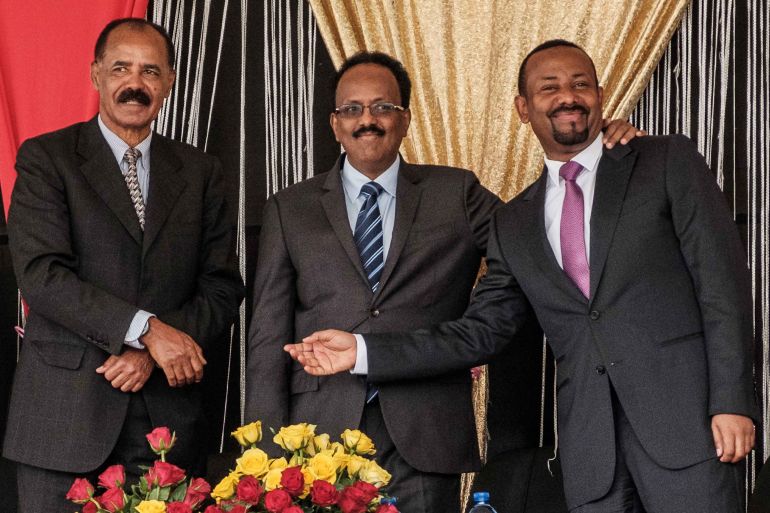
Source: By Zecharias Zelalem
Published On 7 Nov 20237 Nov 2023
Since 1991 when Eritrea gained independence from neighbouring Ethiopia, one of the world’s oldest countries and Africa’s second most populous country, has been landlocked.
With Eritrea in control of the Assab port that had serviced Ethiopia for decades, access to ports became a major talking point in Ethiopia, and just a year after the end of a war fought together as allies, the topic has dragged both countries into a fresh dispute.
On October 26, Ethiopian Prime Minister Abiy Ahmed denied reports that his government was planning to wage war to gain access to a seaport. It was his second attempt in as many weeks at reassuring neighbouring states in the Horn of Africa that his pursuit of a new import gateway for Ethiopia would stay peaceful.
“Our army has never taken the initiative to invade another country in its history, and we won’t start now,” Abiy said during festivities marking the 116th anniversary of the Ethiopian army’s establishment, in the Ethiopian capital Addis Ababa.
“On certain issues that Ethiopia seeks dialogue over, it is being said that a military invasion is a possibility. I’d like to make it clear that there is nothing that we seek to accomplish using force or an invasion.”
But it is unclear if his latest remarks will cool months of uneasiness felt across the region. During another televised speech earlier this month, the prime minister cited demographic ties and maps dating back to the third-century kingdom of Aksum to invoke Ethiopian territorial claims to Red Sea ports in Eritrean territory, and said the question of Red Sea access was “an existential issue”.
The World Is Ignoring a Looming Genocide in Sudan
The World Is Ignoring a Looming Genocide in Sudan
Source: Foreign Policy published on 28 May 2024 a commentary titled “Why Is the World Ignoring a Looming Genocide in Sudan?” by Robbie Gramer.
The Darfur region of Sudan is on the brink of famine and genocide, yet the world is paying little attention as the focus remains on Gaza and Ukraine. This is another plea for the world to step up and address the challenge
Another Plea for Action in Sudan
Another Plea for Action in Sudan
Source: The Atlantic Council published on 28 May 2024 a commentary titled “Sudan Is an Abject Disaster. Is Anyone Listening?” by Bemjamin Mossberg.
This is another call for more US government action on confronting the ongoing disaster in Sudan.
Comment: There is a growing chorus to do something to ameliorate the mayhem in Sudan, but other than speaking out more loudly, there are not a lot of good suggestions for practical and meaningful responses.
EU partners with Kenya to prosecute suspected maritime crime suspects
EU partners with Kenya to prosecute suspected maritime crime suspects

Source: VOA, By Mohammed Yusuf
Tuesday May 28, 2024

Kenya has agreed to help the European Union in dealing with maritime crime suspects in the region, amid a rising threat from pirate activity and attacks by Yemen’s Houthi rebels. The EU, which has a force operating in the Indian Ocean, is concerned that the insecurity which is also affecting ship traffic in the Gulf of Aden and the Red Sea, is disrupting international trade.
With threats to shipping on the rise in the Indian Ocean, Gulf of Aden, and the Red Sea, the European Union is asking Kenya for assistance in prosecuting suspected criminals caught in the region’s waters.
Henriette Geiger, the EU ambassador to Kenya, said the bloc is working with Kenya in dealing with suspected criminals caught in the region’s waters.
“Kenya would conclude a legal finished agreement with the European Union which would allow then EU Atalanta to drop, first seized arms, weapons but also traffickers, arms and drug traffickers, here for prosecution,” she said. “Seychelles has already agreed, they already have a legal finished agreement, but it’s a small island; they cannot stand alone.”
The EU’s Operation Atalanta is a military operation in the Horn of Africa that counters piracy at sea.
Geiger explained that the EU navy force lacks the authority to prosecute suspects and cannot detain them for long without charges. Therefore, countries like Kenya are needed to assist in prosecuting suspects.
Isaiah Nakoru, the head of Kenya’s Department for Shipping and Maritime Affairs, says his country is ready to work on issues that promote security and the free flow of goods and people.
“We have to work together to ensure that we achieve the aspiration for ensuring there is sustainability and security, and all activities that threaten the livelihoods of people and movements of people have to be addressed in partnership with all those who have a stake,” he said.
According to the United Nations Office on Drugs and Crime, Kenya is holding at least 120 suspected pirates and has convicted 18 of them.
Kenya faced criticism about whether its legal system allows the prosecution of suspected pirates accused of having committed crimes far away from its territory. However, in 2012, a Kenyan court ruled the East African nation has jurisdiction to try Somali pirates carrying out attacks in international waters.
Andrew Mwangura is a consultant on maritime safety and security in Kenya. More than ten years ago, he helped negotiate the release of some pirate captives. He says Kenya will always face legal challenges in prosecuting suspects who have not committed a crime in its territory.
“The problem is still the same because there are challenges to prosecution in Kenya of the Somali pirates,” he said. “This pirate activity happens away from Kenya. They do not happen in Kenyan waters, and there will be legal challenges. To prosecute, to arrest them, that’s not a solution. The solution is to fight illegal fishing in East African territorial waters.”
Recently, there have been reports of piracy attacks off the coast of Somalia, sparking worries about the return of Somali piracy. In the early 2010s, Somali pirates hijacked dozens of ships, holding them for millions of dollars in ransom.
Two weeks ago, six suspected pirates accused of attacking a merchant vessel were moved from Somalia to the Seychelles for trial by the EU naval force. Last Friday, the EU force freed a merchant ship and its 17 crew members.
New UN envoy meets with President Mohamud and Prime Minister Barre
New UN envoy meets with President Mohamud and Prime Minister Barre

Source_ Hiiraan Online, Wednesday May 29, 2024

Mogadishu (HOL) – Somali President Hassan Sheikh Mohamud and Prime Minister Hamse Abdi Barre separately met with the acting UN envoy for Somalia, James Christopher Swan, in Mogadishu on Wednesday.
President Mohamud and Swan discussed accelerating cooperation between the Federal Government of Somalia and the United Nations, particularly in the areas of humanitarian aid, peace, and security.
advertisements”President Hassan Sheikh shared with Ambassador James Swan the government’s efforts in the fight against terrorism, economic development, and overall development of the country, expressing his wishes for Swan to effectively fulfill his new duties,” said a statement issued by the Somali Presidency.
Acting Special Representative of the UN Secretary-General for Somalia and Head of the UN Assistance Mission for Somalia (UNSOM) James Swan arrived in Mogadishu on Sunday to boost stabilization efforts.
Swan’s arrival comes after Somalia formally requested the UN to terminate the mandate of UNSOM in the country following a thorough consideration of its strategic priorities.
Kenya gets mandate to help in piracy fight
Kenya gets mandate to help in piracy fight

Source: TheEast African, Monday May 27, 2024
By ANTHONY KITIMO

European Union Ambassador Henriette Geiger addresses the press at the end of bilateral training between European Naval Force, Kenya Navy and the Kenya Coast Guard Service personnel on May 23, 2024. PHOTO | WACHIRA MWANGI | NMG
The United States and the European Union (EU) have intensified the fight against increasing militant groups in the high seas, with Kenya picked as the second country, after Seychelles, to accept and prosecute suspects of maritime crimes.
Nations with top economies have raised concern over disruption of maritime trade in the Red Sea by Yemen’s Houthis and resurgence of piracy in Somalia saying the illegal groups ought to be eliminated.
European Union Naval Force (EU Navfor) has confirmed that Kenya will assist Seychelles in handling maritime crimes suspects due to the increasing maritime cases reported
EU Ambassador to Kenya Henriette Geiger said maritime security is a concern as it has led to disruption of trade and EU will work with different governments to suppress insecurity in the waters.
Speaking in Mombasa during the closure of marine training between Kenya and EU Nation forces, Ms Geiger said EU Navfor will extend its presence in different areas where piracy, narcotics and human trafficking and other crimes are reported.
“EU Navfor Somalia managed to suppress piracy in its previous years but with the current operation Atalanta, the forces will work with different governments to address emerging piracy and the illegal group at Suez Canal,” said the Ambassador.
Accompanied by Spanish ambassador Christina Diaz and her Italian counterpart Roberto Natali, Ms Geiger said although the current threat by Somali piracy is classified as moderate off the Somali Coast, the attacks by Yemen’s Houthi rebels has remained the biggest worry, resulting in the rerouting of vessels to a longer route through the Cape.
“Seychelles has played a key role in handling suspects arrested in the waters and now Kenya will be another country which EU has entered legal agreement with to allow for the trial of suspected pirates arrested by warships,” said the ambassador.
On May 14, six suspected pirates were handed over to the Seychelles authorities for trial by EU Navfor’s Operation Atalanta, allegedly from Somalia who were involved in the piracy attack to the Marshall Islands-flagged Merchant Vessel Chrystal Arctic on the May 10.
Operation Atalanta has legal agreements with Seychelles, which allows for the trial of suspected pirates arrested.
There have been growing concerns over a resurgence of Somali piracy with EU Navfor saying that two or more pirate action groups are active in the area of Socotra Island and 500m East of Socotra in the northwest Indian Ocean near the Gulf of Aden.
The Commanding Officer of the ship, Rear Admiral Francesco Saladino said Atalanta remains committed to supporting the country in the prosecution of the case until it goes to trial.
“Atalanta has a legal finish with countries it operates within their territories which guarantees the entire process within piracy events from deter, arrest, detention, and prosecution in accordance with international law,” said Mr Saladino.
Piracy, although largely suppressed, has not yet been eradicated. Criminal networks associated with piracy have diversified their activities and reoriented their activities towards other maritime crimes, such as the illicit trade of weapons and human trafficking.
At the sametime, deputy commander for civil-military engagement at US Africa Command Ambassador Robert Scott, visited Madagascar, Mauritius and Seychelles last week to meet with partner nation government officials and discuss the countries’ regional efforts to address maritime security challenges.
A focus throughout the trip was on the impact to the countries and ways to counter maritime security challenges the islands face, in waters that are seeing increasing traffic.
“Piracy, Illegal, unreported and unregulated (IUU) fishing, trafficking, and other maritime security challenges severely impact the economies of African coastal nations, supporting their efforts is crucial, especially given the increased maritime traffic due to the conflict in the Gulf of Aden,” said Mr Scott.
Mr Scott’s visits to the Regional Coordination Operations Centre in Seychelles and Regional Maritime Information Fusion Center in Madagascar showcased how nations in the West Indian Ocean are working to counter these challenges.
The ambassador’s visit highlights US Africa Command’s 3D approach, which leverages diplomacy, development, and defense collaboration.
US Africa Command, headquartered in Stuttgart, Germany, is one of 11 US Department of Defense combatant commands, each with a geographic or functional mission that provides command and control of military forces in peace and war.
US Africa Command employs the broad-reaching diplomacy, development, and defense approach to foster interagency efforts and help negate the drivers of conflict and extremism in Africa.
